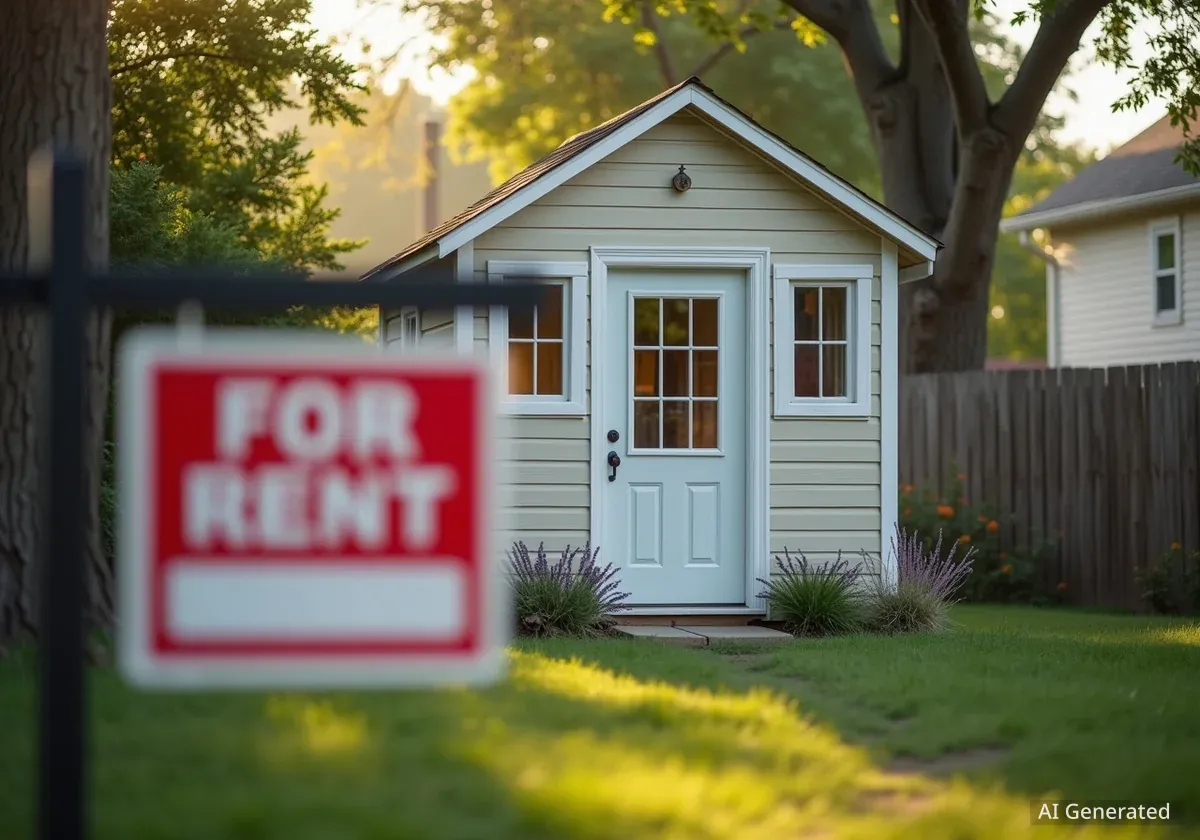Homeowners across the country are exploring creative ways to generate extra income, and converting backyard sheds into livable spaces is a growing trend. Driven by high housing costs and the need for flexible living arrangements, these small units, often called Accessory Dwelling Units (ADUs), seem like a simple solution. However, the legality of renting out a converted shed is a complex issue that depends heavily on local laws and regulations.
Key Takeaways
- Renting out a converted shed is not automatically legal and is governed by local municipal laws, not just state-level regulations.
- A shed must be converted into a legal Accessory Dwelling Unit (ADU), meeting specific building codes for utilities, safety, and size.
- Regulations for ADUs vary significantly between states and even cities, with some areas being more permissive than others.
- Homeowners must contact their local planning and zoning offices before starting any conversion to understand the specific requirements.
- Failing to comply with local laws can lead to substantial fines, eviction orders, and significant legal liability.
Understanding the Legal Landscape of Shed Rentals
The idea of turning an underutilized backyard structure into a source of rental income is appealing, but it is not a simple process. Legality is the primary hurdle. According to consumer law attorney Danny Karon, homeowners cannot simply decide to rent out a shed without adhering to a strict set of rules.
"In most municipalities, it is not automatically legal to just rent out a shed or a storage facility or any sort of backyard unit, even if it's been converted into a so-called tiny home or accessory dwelling unit," Karon explained. These structures fall under the category of ADUs, which also includes garage apartments and basement suites.
What is an Accessory Dwelling Unit (ADU)?
An Accessory Dwelling Unit, or ADU, is a secondary housing unit on a single-family residential lot. They can be detached, like a converted shed or a new small cottage, or attached to the main house, such as a basement apartment. ADUs are seen by many urban planners as a way to increase housing density and provide more affordable living options.
To be legally rentable, a converted shed must meet the same standards as any other dwelling. This involves navigating a web of local regulations that govern construction, safety, and occupancy.
Required Standards for a Livable Dwelling
Before a shed can be legally classified as a rental unit, it must undergo a significant transformation to meet local building codes and safety standards. These are not optional guidelines; they are legal requirements designed to protect the health and safety of tenants.
"For someone to be able to rent out such a unit legally, the space must meet specific building codes, zoning ordinances, and safety standards set by each municipality," stated Danny Karon.
This process involves ensuring the structure is equipped with essential utilities. Key requirements typically include:
- Functional Utilities: The unit must have reliable access to electricity, clean water, and a proper sewage or septic system.
- Climate Control: A safe and functional heating system is mandatory. Depending on the region, air conditioning may also be required.
- Structural Safety: The building must meet minimum standards for ceiling height and have proper emergency exits, such as windows of a certain size and accessibility.
Ignoring these requirements carries severe consequences. "Not meeting the required standards and renting it out anyway could result in hefty fines, eviction orders, and some serious liability issues if anything were to go wrong," Karon cautioned. If a tenant were injured in a non-compliant unit, the homeowner could face devastating legal and financial repercussions.
How Location Dictates ADU Regulations
Whether you can legally rent out a converted shed is almost entirely dependent on where you live. Zoning laws and building codes for ADUs change drastically from one state to another, and even between neighboring cities or counties.
ADU-Friendly States
Some states have recognized the potential of ADUs to alleviate housing shortages and have passed laws to make their construction and rental easier. According to Karon, these states have taken proactive steps to streamline the approval process.
Pro-ADU Legislation: States like California and Oregon have implemented statewide laws that limit the ability of local governments to restrict ADU construction, making it a more viable option for homeowners.
"California, for instance, has statewide laws that significantly ease and streamline the process for renting out an ADU," Karon noted. Other states on the East Coast, such as Connecticut and Maine, have also adopted more permissive policies to encourage the development of these small housing units.
States with Tighter Restrictions
Conversely, many states maintain strict regulations that make building and renting an ADU difficult, if not impossible. These rules are often in place due to concerns about neighborhood character, parking, and strain on public services.
"But other states, such as Alabama and New York, have more restrictive laws in place, making it much more difficult," Karon added. In addition to state laws, local homeowners' associations (HOAs) can also impose their own rules. Karon mentioned that "some towns and homeowners' associations forbid them entirely," creating another layer of regulation that homeowners must navigate.
Steps to Take Before Renting Your Shed
If you are serious about converting a shed into a rental unit, a systematic and cautious approach is essential. Taking shortcuts in the legal process can lead to significant problems later on.
"Renting out a unit on your property can be a fantastic way to earn some extra income and pad your mortgage payment, but ignoring the legal process can land you in some serious trouble, facing stiff fines," Karon advised.
1. Start with Your Local Government
The first and most critical step is to contact your local planning and zoning offices. These departments can provide the specific rules for your property. "They'll want to review local building codes for specific requirements in terms of minimum square footage, ceiling height, and utilities offered while also checking out rental ordinances," Karon explained.
2. Understand Rental Ordinances
Beyond building codes, some cities have specific rules about rentals. For example, some municipalities regulate the minimum duration of a rental agreement. This has become more relevant with the rise of short-term rental platforms like Airbnb, as some areas have rules to prevent short-term stays from creating tenancy rights issues.
3. Seek Professional Legal Advice
Given the complexity of the laws involved, consulting with a professional is highly recommended. "Consult an attorney if you're unsure, specifically if you intend to generate considerable income from the rental," Karon suggested. An attorney specializing in real estate or landlord-tenant law can help ensure you have met all legal obligations before you sign a lease.
Beyond Legal Hurdles: Insurance and Lifestyle
Even after navigating the legal requirements, there are other practical matters to consider. Insuring a converted shed can be a complex task. Standard homeowner's insurance policies may not cover a detached rental unit, and you will likely need a separate landlord insurance policy. Finding an insurance company willing to cover a non-traditional structure like a converted shed may also prove challenging.
Finally, homeowners should be realistic about the lifestyle changes that come with having a tenant in their backyard. What may seem like an easy source of passive income can impact your privacy and use of your outdoor space. Careful consideration of these personal factors is just as important as meeting the legal requirements.





